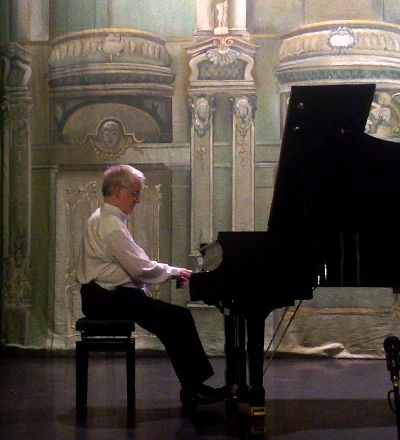 |
|
Prof Nicol Viljoen in the historic Teatr Zdrojowy in Walbrzych, Poland
20 August 2013 |
Profs Nicol and Martina Viljoen from the Odeion School of Music (OSM) recently undertook a very successful trip to Europe where Prof Nicol Viljoen rendered two solo piano recitals in Poland. They also delivered a joint paper at a congress in Budapest.
The first of the two recitals were held in Crakow at the famed Zespol Panstwowych School of Music. At this event, Prof Viljoen essentially recited Chopin Mazurkas and was invited to repeat this performance in Poland in the future.
The second piano recital was in the historicTeatr Zdrojowy im. Henryka Wieniawskiego in Walbrzych. This concert included Preludes, Mazurkas, as well as the Ballad in G minor by Chopin. After the Mazurkas, the audience rewarded Prof Viljoen with a standing ovasion – and again at the end of the concert. As a result of this, the chief organiser of the event, Jerzy Kosek, who is also the conductor of the Filharmonia Sudecka, invited Prof Viljoen to perform as soloist with his orchestra next year.
Kosek also invited Conducting students at the OSM to work with the Filharmonia under his leadership on an exchange basis. He indicated that he would like to strengthen the ties with the University of the Free State and the Odeion School of Music. Two members of the Filharmonia Sudecka are currently doctoral students in Performing Arts at the OSM, namely Karol Legierski (concertmaster) and Marianne Cilliers (first violin), while the co-concertmaster, Dorota Graca, is in the process of registering for doctoral studies at the OSM.
The paper delivered by Profs Viljoen in Budapest, formed part of the interdisciplinary congress, ‘The Arts in Society,’ where more than twenty countries were represented. Their paper dealt with the post-apartheid oeuvre of the South African composer, Hans Huyssen. Charla Schutte, another doctoral student at the OSM, delivered a paper on an interpretation of indoctrination songs on the basis of an analytical model by the philosopher Johann Visagie.
During the trip, Prof Martina Viljoen also had a productive meeting with the executive manager of Common Ground Publishers, an academic publisher based in the USA, with a view to publish work from the OSM.